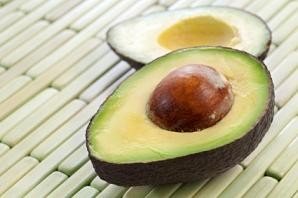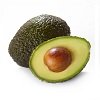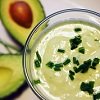Avocado Nutrition Facts,
The Health Benefits of Avocado
All about Avocado nutrition facts, Avocado health benefits, Avocado calories and Avocado nutrients
We provide you with the Avocado nutrition facts and the Avocado health benefits to help you to lose weight and eat a healthy diet.
Avocados were originally native to Central and South America and are grown in most tropical and subtropical countries. Avocado fruit is also known as the Alligator Pear for its leather-like skin and shape. Avocado trees are tall evergreens that can grow 65 feet in height. There are many varieties of avocados which can be divided into three main categories: Mexican, Guatemalan, and West Indian.
Hass is the most popular variety in the USA, which has a grainy dark brown skin. The Fuerte is another common type of Avocado. It is larger than the Hass and has a more defined pear shape and smooth, dark green skin. Avocado fruit is not sweet but fatty with an almost creamy textured green and yellow flesh which has a nutty flavour. It is used in both sweet and savoury dishes. It is very popular in vegetarian dishes as a substitute for meat because of it's high fat content and the nutritional benefits of Avocados that are provided.

Avocado Health Benefits
Avocado and Cholesterol: About 82% of calories in an Avocado come from monounsaturated fat. A study conducted among people with moderately high cholesterol levels has shown that a 1 week diet that included avocados significantly decreased total cholesterol and LDL cholesterol levels (bad cholesterol) along with an 11% increase in good – HDL cholesterol.
Avocado and Blood Pressure: The Avocado provides a good source of potassium; one serving (100g or 3.5oz) gives 10% of our recommended daily intake (RDI). Potassium helps to regulate our blood pressure. Avocado provides a third more potassium than a banana. One research study found that half an avocado eaten daily, lowers our cholesterol.
Avocado and Heart Disease: One serving of Avocado contains 15% of the recommended daily intake (RDI) of folate (folic acid), a nutrient that lowers the risk of having heart attacks or fatal heart disease. One piece of research has suggested that if you eat a diet rich in Folate, the incidence of cardiovascular disease is much lower. Additionally the avocado is rich in copper, which is thought to aid the formation of red blood cells.
Avocado and Cancer: Avocados contain oleic acid which is a concentrated source of Lutein which is a carotenoid. Oleic acid has been shown to inhibit breast cancer. Fruit also contains carotenoids such as zeaxanthin, alpha-carotene and beta-carotene, plus Vitamin E. Research published in the Journal of Nutritional Biochemistry showed avocados stopped cancer cells from growing. Carotenoids are fat soluble and need fat to be absorbed into the bloodstream. Other research has shown that prostate cancer cells may be killed given the combination of vitamin E and carotenoids. The Hass avocado contains phtyonutrients and is bursting with lutein. This variety has been shown to neutralise free radicals that may cause cancer.
Avocado and General Health: Avocados provide an excellent source of mono-unsaturated fats, the B vitamins, vitamin E and fiber. It also provides a good source of lecithin, useful for increasing our brain function.
When buying an avocado, it should feel slightly soft when the skin is pressed. It will continue to ripen once you have bought it. If you don’t want to eat the whole avocado once you have cut it open, sprinkle with a little lemon juice, otherwise the flesh will go brown.
Nutritional Value of Avocado
| Avocado nutritional value per 100 g (3.5 oz) Scientific Name: Persea americana |
|
|---|---|
| Proximates: | |
| Water | 73.23 g |
| Energy | 670 kJ (160 kcal) |
| Protein | 2.00 g |
| Carbohydrates | 8.53 g |
| Fiber | 6.7 g |
| Total Fat: | 14.66 g |
| saturated fat | 2.126 g |
| monounsaturated fat | 9.799 g |
| polyunsaturated fat | 1.816 g |
| Cholesterol | 0 mg |
| Minerals: | |
| Calcium, Ca | 12 mg (1.2 %) |
| Iron, Fe | 0.55 mg (3 %) |
| Magnesium, Mg | 29 mg (7 %) |
| Phosphorus, P | 52 mg (5 %) |
| Potassium, K | 485 mg (10 %) |
| Sodium, Na | 7 mg (0.3 %) |
| Zinc, Zn | 0.64 mg (4 %) |
| Copper, Cu | 0.190 mg (10 %) |
| Manganese, Mn | 0.142 mg (7 %) |
| Selenium, Se | 0.4 mcg (0.6 %) |
| Vitamins: | |
| Vitamin C | 10.0 mg (17 %) |
| Thiamine (Vit. B1) | 0.067 mg (4.5 %) |
| Riboflavin (Vit. B2) | 0.130 mg (8 %) |
| Niacin (Vit. B3) | 1.738 mg (9 %) |
| Pantothenic acid (B5) | 1.389 mg (14 %) |
| Vitamin B6 | 0.257 mg (13 %) |
| Folate (Vit. B9) | 58 mcg (15 %) |
| Vitamin B12 | 0 mcg |
| Vitamin A | 146 IU (3 %) |
| Vitamin E | 2.07 mg (10 %) |
| Vitamin K | 21 mcg (26 %) |
| Percentages are relative to US Recommended Daily Intake (RDI) for adults. | |
Compare avocado nutrition facts to the other fruits.
Author: Lana Soko
You Might Also Like:
Like This Page?
|
Share This Page:
|
Search Our Site:

Free E-Book:
We Recommend:
Looking to get your body into great shape? Get the very best results for your efforts and money! Save your valuable time from surfing the internet. These are theBestselling Weight Loss Programs

Programs that work and have thousands of satisfied customers worldwide!

 |




